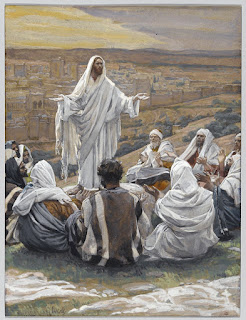7th August Trinity
Luke 10: 25 - 37
 |
| van Gogh |
On one occasion an expert in the law stood up to test Jesus. “Teacher,” he asked, “what must I do to inherit eternal life?”
“What is written in the Law?” he replied. “How do you read it?”
He answered, “‘Love the Lord your God with all your heart and with all your soul and with all your strength and with all your mind’; and, ‘Love your neighbor as yourself.’”
“You have answered correctly,” Jesus replied. “Do this and you will live.”
But he wanted to justify himself, so he asked Jesus, “And who is my neighbor?”
In reply, Jesus said: “A man was going down from Jerusalem to Jericho when he was attacked by robbers. They stripped him of his clothes, beat him and went away, leaving him half dead. A priest happened to be going down the same road, and when he saw the man, he passed by on the other side. So too, a Levite, when he came to the place and saw him, passed by on the other side. But a Samaritan, as he traveled, came where the man was; and when he saw him, he took pity on him. He went to him and bandaged his wounds, pouring on oil and wine. Then he put the man on his own donkey, brought him to an inn and took care of him. The next day he took out two denarii and gave them to the innkeeper. ‘Look after him,’ he said, ‘and when I return, I will reimburse you for any extra expense you may have.’
“Which of these three do you think was a neighbor to the man who fell into the hands of robbers?”
The expert in the law replied, “The one who had mercy on him.” Jesus told him, “Go and do likewise.”
7th August Trinity
Sept 2, 2018
Luke 10:25-37
 |
| Corrine Vonaesch |
One way into understanding the gospel parables is to consider each of the characters as parts of a single human being. The man who was robbed and beaten represents that part of all of us traveling on life’s path - a part of our soul has been robbed of our spiritual wealth and beaten down until our souls are half-dead.
There also lives in each of us a priest and temple servant who serve the first part of the commands of the law, the part about serving God with one’s whole heart, mind, and strength. It is a holy office, requiring that one show up at the appointed time, ritually clean, for a service performed on behalf of the whole people.
And we all have an inner Samaritan, a foreign stranger traveling through life, who is under no tribal obligation to help a Hebrew from Jerusalem. And yet help he does, purely out of human compassion. He fulfills the second part of the commandment, the part about loving whoever one stands next to. He does so not only by personally ministering to the wounded but also by paying someone else to continue his efforts.
What Christ is saying is that our ritual observances toward God are only a part of what serving God means. We also need to fulfill the second part of the commandment, the commandment of love for our fellow human beings. We need to find within ourselves healing ways to serve the God within others. This does not necessarily have to be dramatic. But we need to be able to inwardly pause and help others we encounter along the way. We can comfort with a kind word or even a smile. We can offer something that helps soothe a wounded soul. We can help someone in whatever way we can toward their own healthier future. We can even, if necessary, make it possible for someone else to do it for us. And we can always pray for others.
 |
| Christ as Good Samaritan, Codex Rossanensis |
We turn towards God with all the strength of all our soul’s capacities. And we turn toward our fellow human beings with the strength of our love. Love manifests not only in thoughts and feelings but most especially in deeds. For we are God’s hands on earth. As St. Theresa of Avila said,
Christ has no body now but yours
No hands, no feet on earth but yours
Yours are the eyes through which He looks
compassion on this world
Christ has no body now on earth but yours.
compassion on this world
Christ has no body now on earth but yours.

















